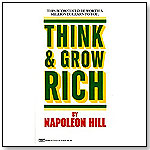|
|
Event Marketing Guru’s Corner: Change Your Mindset to “Win” Achieve Success Through Positive Repetition and Visualization
 resides between our ears, and it possesses latent powers that lie dormant, or enormously underutilized, in practically all of us. resides between our ears, and it possesses latent powers that lie dormant, or enormously underutilized, in practically all of us.According to Napoleon Hill, author of “Think and Grow Rich,” programming our subconscious with positive images of successful desired end-states is the key to unlocking potential. Hill famously believed the potential of the human mind to be infinite. THINK POSITIVE Because the subconscious cannot distinguish between vivid imagination and reality, the more vividly you can visualize images of upcoming positive performances, the better. Your subconscious goes to work to bring a target into existence. You must imagine, visualize in detail, and believe with passion in the successful outcome of every performance you’re facing. This practice does not come naturally; it requires constant work until it becomes an ingrained habit. This habit — or simulated winning-in-advance tendency — creates powerful expectations that have a profound effect on outcomes. You will not always get what you want, but you will almost always get what you expect. Many athletic coaches communicate concerns over their respective teams being “overconfident.” I want to communicate my desire for you to be super confident. I want you to expect to win every time. The motivation to be super confident in expecting to win is predicated on your beliefs about your positive outcomes . You must always start with the end in mind, believing fervently in your emotionally charged visual images of successful outcomes before every performance. In short, what you “see” is what you’ll get. AFFIRM YOURSELF We are always talking to ourselves, either consciously or subconsciously. One of the most powerful techniques to heighten effectiveness is silent repetition of affirmations. Since the subconscious only accepts, internalizes, and acts on suggestions couched in the present tense, telling yourself “My next call will be successful” is not enough to be effective. Instead, silently repeat “This is an exceptional presentation and outstanding new account,” as if you had already successfully acquired the new client.  According to Dr. Dennis Waitley, a best-selling author and motivational trainer for U.S. Olympic athletes, “Over 85 percent of all success is attitudinal.” It has never been who you are that holds you back. It’s only who you’ve believed yourself to be. Our minds don’t just interpret what happens in our world. Our minds help cause what happens to us. Therefore, logic would render a negative attitude a “fool’s bet!” According to Dr. Dennis Waitley, a best-selling author and motivational trainer for U.S. Olympic athletes, “Over 85 percent of all success is attitudinal.” It has never been who you are that holds you back. It’s only who you’ve believed yourself to be. Our minds don’t just interpret what happens in our world. Our minds help cause what happens to us. Therefore, logic would render a negative attitude a “fool’s bet!” “If you think you can do a thing or think you can't do a thing, you're right,” said Henry Ford; his words hold true today. MINIMIZE SELF-DEFEAT Since you become what you think about, why not consciously hold the image of your “ideal self” on the screens of your mind? You may not be able to completely eliminate self-defeating thoughts, but it is important to minimize them to avoid “staying stuck” or becoming unresponsive to more positive options. If you are experiencing self-defeating thoughts and images, immediately stop and ask these questions: • What is the message or belief that I am telling myself? Is it accurate? • Is there a different way to look at this situation? • What could I do to turn this into an opportunity for good and improvement? • What is the hidden, offsetting positive outcome to this perceived negative situation? Hope is a good thing. In the ‘90s epic movie, “Shawshank Redemption,” Tim Robbins's character, Andy Dufrain, writes to Morgan Freeman’s character, Red, “It’s a simple choice. Get busy living, or get busy dying.” Learn from the past and plan for the future. But always live in the here and now — the only moment in history over which you have any control. The present truly is a “present.” By controlling your today, you can shape your tomorrow. Carpe diem!  Writer's Bio: Charles W. Allen is an independent consultant for professional event marketing solutions and specializes in sales training, motivational speaking and maximizing sponsorship sales. He also serves as executive director of the International Economic Alliance, which originated at Harvard University. Read more articles by this author Writer's Bio: Charles W. Allen is an independent consultant for professional event marketing solutions and specializes in sales training, motivational speaking and maximizing sponsorship sales. He also serves as executive director of the International Economic Alliance, which originated at Harvard University. Read more articles by this author |
| |||||||||||||||||||||||||||||||||
Disclaimer Privacy Policy Career Opportunities
Use of this site constitutes acceptance of our Terms of Use.
© Copyright 2025 PlayZak®, a division of ToyDirectory.com®, Inc.



